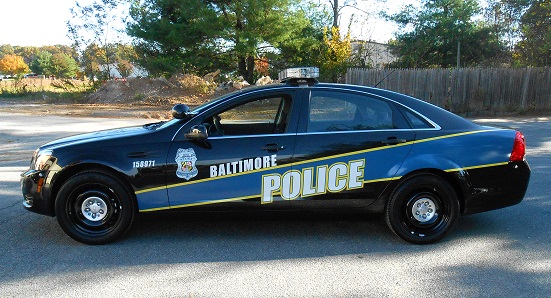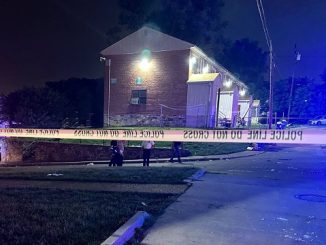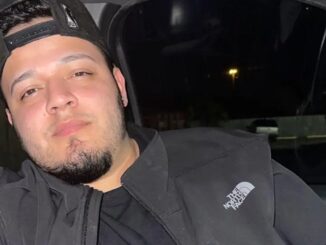
A federal jury has found two Baltimore police officers guilty for their role in a sprawling police corruption case that involved robbing city residents.
Daniel Hersl and Marcus Taylor were convicted of racketeering and robbery charges and cleared of others.
They were part of an elite unit tasked with seizing illegal firearms. But instead the squad went rogue, stealing cash and guns and reselling drugs.
Thousands of cases could have been affected by the unit’s corruption.
Baltimore Police Commissioner-Designate Darryl De Sousa issued a statement after the verdict, noting the trial uncovered “some of the most egregious and despicable acts ever perpetrated in law enforcement”.
“Our job moving forward is to earn back the trust and respect of the community,” he said, adding that it would “be a process”.
Baltimore police have struggled to regain public trust after Freddie Gray, a young black man, died in police custody in 2015.
The city’s police department is currently subject to federal monitoring as part of court-ordered reforms due to discriminatory and unconstitutional policing.
The verdict follows three weeks of explosive testimony in a federal courtroom.
Additional officers named in the testimony have either been suspended or announced their retirement.
A jury deliberated on Thursday and Monday over a series of charges stemming from an FBI investigation of the Baltimore Police Department unit, the Gun Trace Task Force (GTTF).
In additional to the guilty findings, they cleared Hersl and Taylor on charges of possession of a firearm in a crime of violence. They face a maximum sentence of 60 years.
After the verdict on Monday State’s Attorney Marilyn Mosby called the facts revealed at the trial “deeply disturbing” and said her office was “continuing to comb through the cases” potentially implicated by the officers’ illegal acts.
According to the Baltimore city’s Office of the Public Defender, as many as 3,000 cases could have been affected by the GTTF.
All but one member of the task force was indicted and arrested in March 2017.
Six former officers pleaded guilty, and four of those – Maurice Ward, Jemell Rayam, Evodio Hendrix and Momodu Gondo – were called to the witness stand to testify against their former colleagues.
They detailed a series of thefts that went back years, including pilfering cash during street arrests, cracking safes, stealing kilograms of drugs to resell and armed robberies committed by wearing masks and brandishing guns.
Over the years, the thefts amounted to hundreds of thousands of dollars.
Although Hersl and Taylor were on trial, much of the most shocking testimony centred on the actions of the unit’s officer-in-charge, former sergeant Wayne Jenkins.
Ward testified Jenkins liked to stop anyone over the age of 18 carrying a backpack, and pulled over specific vehicle models he called “dope boy cars” without cause.
The unit routinely filed false police reports to cover their tracks, according to court testimony.
Former detectives also testified they went into houses without search warrants for so-called “sneak and peeks” to see if there was money or drugs inside.
Jurors were shown Halloween masks, an 18-inch (46cm) machete and a grappling hook the men said Jenkins intended to use in home invasions.
Jenkins advised them to carry realistic looking BB guns, two detectives said, so they could plant them if they shot an unarmed citizen.
Jurors also heard from Donald Stepp, a bail bondsman who said he resold an estimated $1m (£720,000) worth of stolen drugs for Jenkins, including two garbage bags full of prescription opiates that Stepp said were taken from pharmacies during the civil unrest following the death of Freddie Gray.
Throughout the trial, the defence attempted to discredit the testimony of the former officers, saying they lied about Hersl and Taylor’s participation in hopes of getting reduced sentences. They also picked apart the credibility of witnesses who admitted they were dealing drugs at the time they were robbed.
Hersl’s lawyers also argued the 17-year veteran was being unfairly held accountable for some of the task force members’ most egregious acts.
“The government lumped Daniel Hersl’s wrong conduct – there’s no excuse for it – into a racketeering enterprise where other officers did commit real robberies, real drug trafficking and real extortion,” said defence lawyer William Purpura.
While Taylor’s family declined to be interviewed, Hersl’s older brother Steve Hersl sobbed outside the courtroom and expressed outrage at the verdict.
“My brother was innocent,” he told reporters. “Let’s talk about the corruption on top – everybody starts from the bottom, the little guy. My brother was a little guy.”
But prosecutors argued both officers were just as involved as their colleagues were, showing specific instances of theft.
During the trial, about a dozen additional names of Baltimore police officers were mentioned in connection with illegal or improper acts, including one who tipped off GTTF that they were under investigation.
The testimony had real-time effects – one officer was suspended. Another high-ranking officer announced his retirement on the day he was mentioned.
A special agent for the FBI told the court a wider corruption investigation is active and ongoing, opening up the possibility of more charges.
Source: bbc.co.uk






Be the first to comment